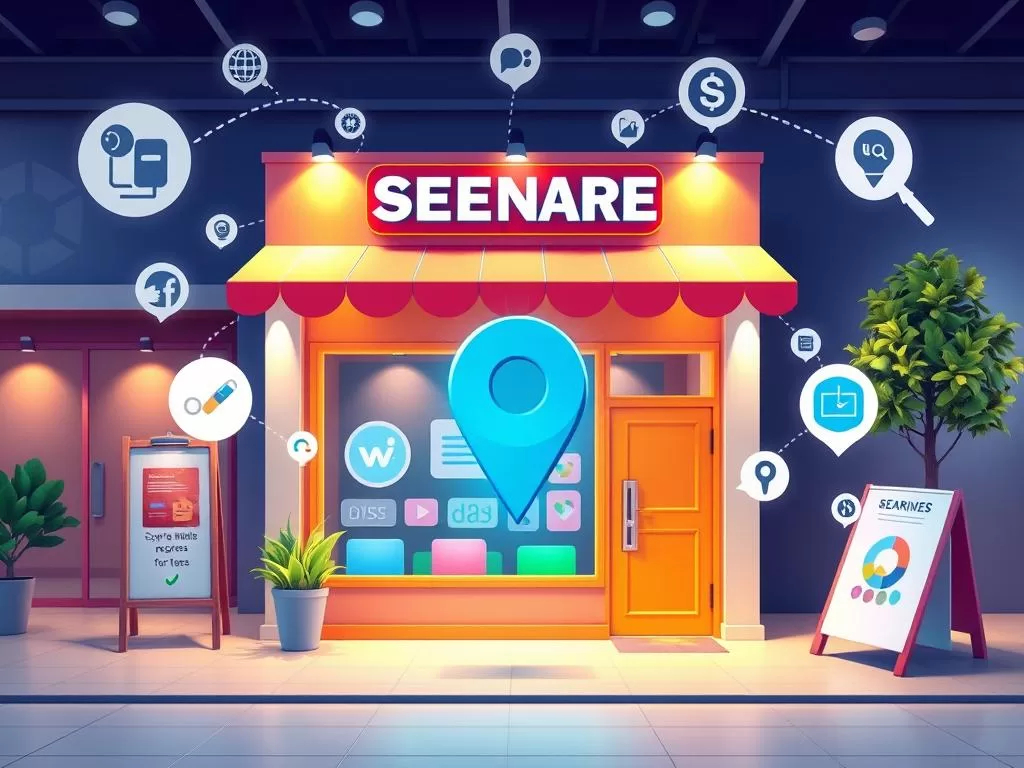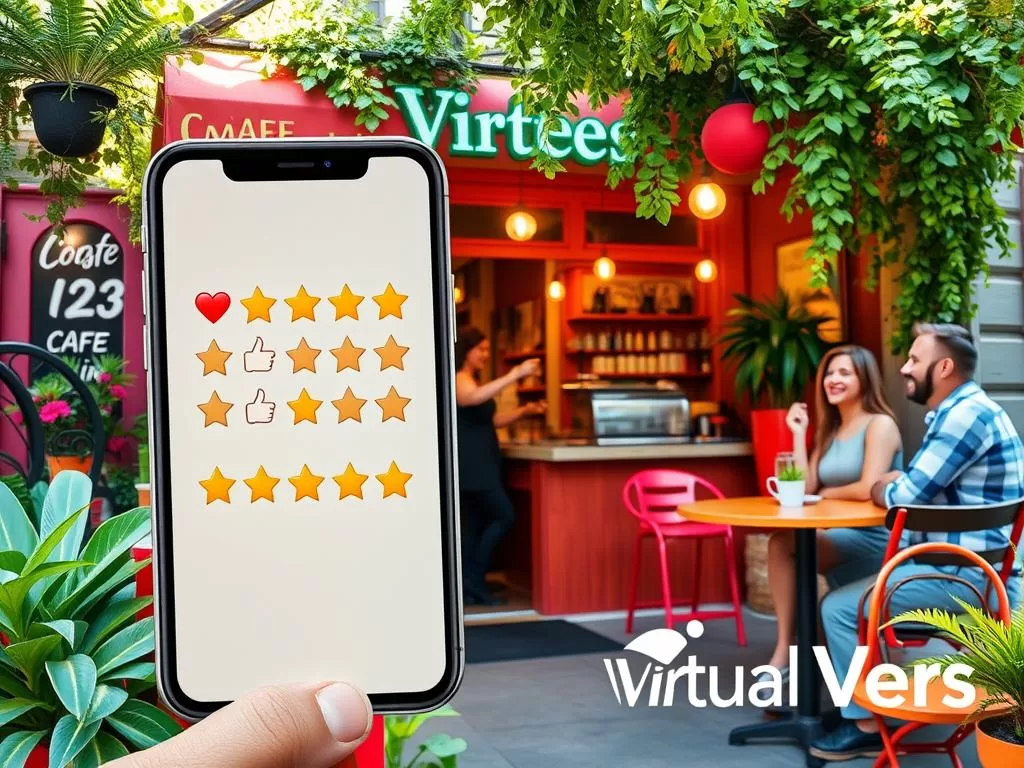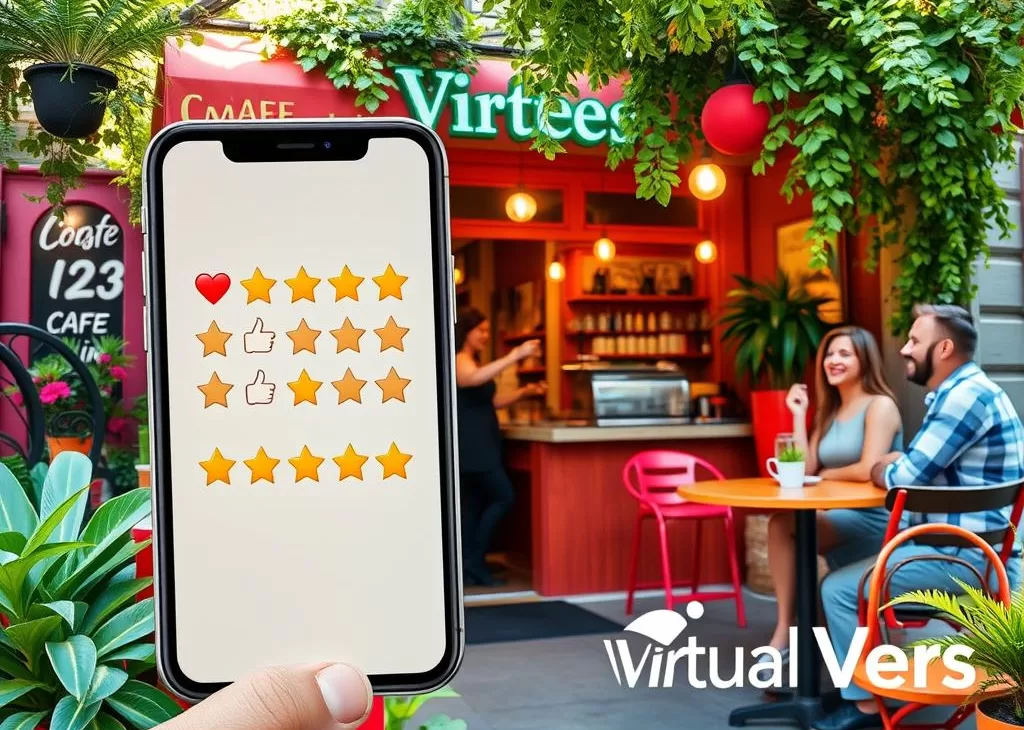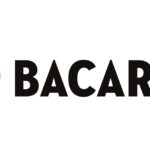Mastering local SEO is key for small businesses. It helps drive more targeted traffic and attract new customers. This guide will show you how to optimize your online presence and improve your local search rankings.
Whether you’re new to local SEO or want to improve your efforts, this article is for you. You’ll learn how to optimize your Google My Business listing and use local link building tactics. These strategies will help your small business grow.

Key Takeaways
- Understand the importance of local SEO for small businesses and how it can drive more targeted traffic and local customers.
- Learn how to optimize your Google My Business listing to improve your visibility in local search results.
- Discover effective strategies for claiming and managing your local directory listings to ensure consistent NAP (Name, Address, Phone) information.
- Implement on-page optimization tactics, such as localizing content and meta tags, to optimize for local keyword variations.
- Leverage local link building strategies to boost your authority and improve your local search rankings.
Importance of Local SEO for Small Businesses
As a small business owner, you know how key it is to find local customers. Local search optimization is a great way to do this. It makes sure your business shows up when people search for what you offer nearby.
Understanding Local Search Intent
People search online for many reasons. Some want info, others are ready to buy. Local search intent is about what people want when they search for local businesses. Knowing this helps you meet your customers’ needs better.
Reaching Target Customers in Your Area
Location-based marketing is vital for local SEO. By making your online presence local-friendly, you attract more local customers. This can boost your sales and make your business stronger.
Adding local SEO to your marketing plan is crucial for small businesses. It helps you improve your local search rankings and connect with your audience. By understanding local search intent and using location-based marketing, you can get more leads and sales.
Optimizing Your Google My Business Listing
Your Google My Business (GMB) listing is key for local SEO. It helps you show up in local searches and connect with people nearby. By focusing on google my business optimization and local listing management, you can draw more local customers and leads.
First, make sure your GMB listing is filled out and current. Add your business name, address, phone, website, hours, and a good description. Pick the right category and use keywords to match local searches.
Then, add great visuals to your GMB listing. Use photos and videos to show off your products and business. This helps customers understand what you offer and makes a good first impression.
- Keep your GMB listing updated with any changes, like new hours or services.
- Ask happy customers to leave reviews to boost your visibility and trust.
- Reply to all reviews, good or bad, to show you care about your customers.
By optimizing your Google My Business listing, you can rank better in local searches. This helps you connect with more customers and grow your business.
| Key Factors for Optimizing Your GMB Listing | Description |
|---|---|
| Complete Business Information | Make sure your business details like name, address, phone, hours, and website are correct and current. |
| Captivating Visuals | Upload high-quality photos and videos to show off your business, products, and services. |
| Positive Reviews | Ask happy customers to leave reviews and answer all reviews professionally. |
| Relevant Keywords | Use relevant keywords in your business description and other listing details. |
Claiming and Managing Local Directory Listings
Claiming and managing your business on major local directories is key for local SEO. These listings boost your online presence and credibility. They help you show up in local searches and attract more customers.
Major Local Directories to Focus On
There are several important platforms for local directory listings:
- Yelp
- Bing Places for Business
- Apple Maps
- Facebook Business Page
- Yellow Pages
- Manta
Claiming and optimizing your listings on these sites can help you reach more people. It increases your chances of showing up in local searches.
Ensuring Consistent NAP Information
Keeping your Name, Address, and Phone (NAP) info the same everywhere is crucial. Inconsistent NAP data can hurt your local SEO. Make sure to update your NAP details on each listing to keep your online presence strong.
By focusing on your local directory listings and keeping your NAP info consistent, you can improve your small business’s local visibility. This will help attract more local directory listings, local link building, and consistent nap information for your customers.
How to Master Local SEO for Small Businesses
As a small business owner, mastering local SEO is key to getting more customers. By making your online presence strong and connecting with your community, you can beat your rivals. This way, you become the top choice for people looking for what you offer.
To start, let’s look at the main steps to master local SEO for your small business:
- Optimize your Google My Business listing: Make sure your business info, like name, address, and phone number, is right and the same everywhere online.
- Claim and manage local directory listings: Take control of your listings on big sites like Yelp, Bing Places, and Apple Maps. This boosts your visibility and builds trust with potential customers.
- Localize your content and meta tags: Use local keywords and phrases in your website’s content, titles, and meta descriptions. This tells search engines you serve a specific area.
- Leverage local link building strategies: Connect with local groups, organizations, and other businesses to get valuable backlinks. This boosts your local standing.
- Engage with your local community: Join local events, team up with other small businesses, and support community projects. This builds relationships and raises your visibility.
By using these local seo strategies and small business seo tips, you’ll be on your way to mastering local SEO. This will help attract more customers to your small business.
| Local SEO Tactic | Benefits |
|---|---|
| Google My Business Optimization | Improved local visibility, increased trust, and better customer engagement |
| Local Directory Listings | Enhanced online presence, increased citation signals, and higher search engine rankings |
| Localized Content and Meta Tags | Better alignment with local search intent, higher relevance, and better positioning in local SERPs |
| Local Link Building | Strengthened local authority, improved trust signals, and increased referral traffic |
| Community Engagement | Stronger brand reputation, increased customer loyalty, and more opportunities for word-of-mouth marketing |
Enhancing On-Page Optimization for Local SEO
Your website’s on-page optimization is key for local SEO. By localizing your content and meta tags, you show your business’s local appeal. This helps attract customers looking for your products or services in your area.
Localizing Content and Meta Tags
Include your city, state, or region in your website’s content. This means adding it to page titles, headings, and body text. It helps search engines see your business’s local focus.
Also, make sure to optimize your meta tags. Use local keyword optimization in your title tags and meta descriptions. This makes your website’s search snippets more appealing to local users.
Optimizing for Local Keyword Variations
Find the local keyword variations your customers use. This could be “plumber in [city]” or “best Italian restaurant in [city]”.
Use these keywords naturally in your content. Avoid stuffing them. This boosts your local search rankings and attracts the right customers.
Leveraging Local Link Building Strategies
Building a strong local link profile is key for better local search rankings. Good local link building gets you quality backlinks from local sites, directories, and groups. This boosts your local authority and makes you more visible in your area.
Here are some top ways to use local link building for your small business:
- Claim and Optimize Local Directory Listings: Make sure your business is on big local directories like Google My Business and Bing Places. Use the same name, address, and phone number everywhere to help your local SEO.
- Collaborate with Local Bloggers and Influencers: Talk to local bloggers and influencers in your field or area. Offer to write guest posts or share your expertise. This shows off your local knowledge and products.
- Participate in Local Events and Sponsorships: Sponsor local events or charities to get backlinks from their sites. This also helps you connect with your audience and build a strong local brand.
- Leverage Local Partnerships and Co-Marketing: Work with other local businesses on marketing projects. This can include joint content or promotions. It’s a win-win for both of you and boosts your local visibility.
Using these local link building strategies can improve your online presence. It also helps you rank better in searches and attract more local customers.

Engaging with Local Communities and Events
As a small business owner, getting involved in your local community is key. It can really help your local SEO. By teaming up with local groups and sponsoring events, you become more visible. You also get to connect with your audience in a meaningful way.
Building Local Partnerships and Sponsorships
Creating local partnerships can change the game for your business. Look for chances to work with other businesses or groups that share your values. You might host events together, promote each other’s stuff, or support a local cause.
Supporting local sports teams, festivals, or charities is a great idea. It shows you care about the local community engagement. Don’t forget to show off your business by putting your name and logo everywhere. Also, tell people to check out your website or social media.
By getting involved and making local partnerships, you boost your business’s image. You’ll gain more loyal customers and improve your local SEO.
Monitoring and Responding to Local Reviews
In today’s world, local reviews are key for your small business’s online image. They affect your reputation and help with local SEO. It’s vital to know how to handle local reviews well.
Start by checking your reviews on sites like Google, Facebook, Yelp, and others. This keeps you updated on what customers say. You can then quickly respond to good or bad feedback.
- Answer both positive and negative reviews in a professional way.
- Thank customers for their feedback, even if it’s not good.
- Offer help or solutions to show you care about their satisfaction.
Also, try to get happy customers to leave reviews. This can help your rating and make you more visible online. Make it easy for them to share their good experiences.
| Platform | Importance for Local Reviews |
|---|---|
| Google My Business | Google’s platform for local business listings, reviews are a key factor in local SEO and credibility. |
| A popular platform for consumers to share their experiences with local businesses. | |
| Yelp | A leading directory for local reviews, particularly in service-based industries. |
By keeping up with local reviews and responding well, small businesses can improve their online image. This helps with customer relationships and local search visibility. It’s crucial for success online.

Utilizing Local SEO Tools and Analytics
Using the right local SEO tools and analytics is key. They give you insights, track your progress, and help you make better decisions. They also help your small business show up better online.
Popular Local SEO Tools and Platforms
Choosing the right local SEO tools can be tough. But picking a few top platforms can really help. Here are some of the best local SEO tools to use:
- Google My Business Insights – This free tool from Google gives you deep analytics. It shows how customers interact with your listing, what they search for, and how well you’re doing.
- Moz Local – Moz Local helps you manage your business listings online. It makes sure your name, address, and phone number are the same everywhere.
- BrightLocal – BrightLocal offers tools for local SEO. It tracks your rankings, helps you get more citations, and manages reviews. This helps you improve your local presence.
- Yext – Yext is a top platform for managing your business listings. It lets you update your info quickly across many directories and search sites.
- Local SEO Checker – This tool from SEMrush audits your local SEO. It finds ways to improve and tracks your progress over time.
| Tool | Key Features | Pricing |
|---|---|---|
| Google My Business Insights | Analytics on customer engagement, search queries, and performance metrics | Free |
| Moz Local | Listing management, citation building, and NAP optimization | $129 per location per year |
| BrightLocal | Rank tracking, citation building, and review management | Starts at $29 per month |
| Yext | Listing management and sync across directories and search platforms | Customized pricing based on business needs |
| Local SEO Checker | Local SEO audits, optimization recommendations, and performance tracking | Starts at $99 per month |
By using these local seo tools and local seo analytics, you can understand your local market better. You can track your progress and make smart decisions. This will help your small business be more visible online.
Integrating Local SEO with Other Marketing Channels
To get the most from your local SEO, mix it with other digital marketing. This includes social media and pay-per-click (PPC) ads. Together, they make a strong digital marketing plan for your small business.
Aligning Local SEO with Social Media
Using local SEO and social media together is powerful. Make your social media profiles better with local keywords and details. This boosts your online presence.
Ask customers to leave reviews and share your content on Facebook, Instagram, and Google My Business. This helps your local SEO and brings more visitors to your site.
Leveraging Local SEO and PPC
Combining local SEO with PPC ads is very effective. Use local keywords and target your ads to people in your area. This grabs the attention of those looking for your business locally.
| Tactics | Benefits |
|---|---|
| Local SEO and Social Media Integration | Improved online visibility, increased customer engagement, and enhanced local brand awareness |
| Local SEO and PPC Alignment | Targeted reach to local customers, faster results, and a more comprehensive digital marketing strategy |
By blending your local SEO with other marketing, you create a complete digital strategy. This helps your small business shine in your local market and attract more customers.
Conclusion
Mastering local SEO is key for small businesses to succeed today. By using the tips from this guide, you can get more people to see your business online. This helps you attract more customers in your area and beat your rivals.
Optimizing your Google My Business listing is a great start. You should also use local directories and partner with local businesses. Plus, keep an eye on what people say about you online. These steps help you become an expert in local SEO.
Start using these local SEO tips now. Your small business will grow and thrive in your community. A strong local SEO presence is crucial for small businesses. It helps you connect with your audience and stand out online.
FAQ
What is the importance of local SEO for small businesses?
Local SEO helps small businesses reach people nearby. It makes sure your business shows up when people search online. This way, more people can find and visit your store.
How do I optimize my Google My Business listing for local SEO?
Your Google My Business (GMB) listing is key for local SEO. Keeping it up to date helps more people find you. It’s a great way to connect with locals.
What local directories should I focus on for my small business?
Claiming your business on big local directories is important. Make sure your Name, Address, and Phone (NAP) info is the same everywhere. This helps people find and trust your business.
What on-page optimization strategies should I use for local SEO?
On-page optimization is vital for local SEO. Make your website’s content and meta tags local-friendly. Also, find and use local keywords that people search for.
How can I build high-quality local backlinks for my small business?
Getting good local backlinks helps your business rank better. Get links from local sites, directories, and groups. This shows you’re a trusted local business.
How can I engage with my local community to improve my local SEO?
Joining local events and partnering with groups boosts your SEO. It helps you reach more people and build trust.
Why is it important to monitor and respond to local reviews?
Reviews are key for local SEO. They affect your business’s reputation. Learn to handle reviews well to improve your ranking and gain trust.
What local SEO tools and analytics should I use for my small business?
Using the right tools helps you understand and improve your SEO. Find tools that help you track and analyze your online presence.
How can I integrate local SEO with my other marketing channels?
Combining local SEO with other marketing is smart. It makes your online presence stronger. Learn how to mix local SEO with social media and ads for better results.









